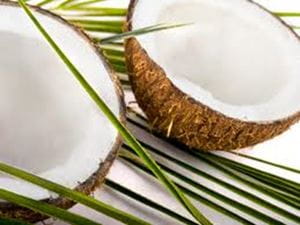
Coconut milk, coconut oil, coconut water, coconut pulp — there’s been a lot of buzz in recent years about the health benefits of coconut. This tasty fruit has been a staple food and natural remedy in various cultures for centuries, but more recently its been making a comeback in North America. Some cooks swear by it, and some companies say their products can treat everything from kidney stones to HIV — and even help you lose weight. But is coconut really the latest superfood? Here’s a look at two of the products getting all the attention.
Coconut oil
Its benefits for skin and hair are widely known and generally not controversial — but eating coconut oil is another story. There is still a lot of debate about the health benefits versus potential harms of this ingredient turned dietary supplement. At first glance, the numbers aren’t promising: one tablespoon of coconut oil has 14 grams of fat and 12 grams of saturated fat (though it doesn’t have any cholesterol). Hydrogenated coconut oil — where hydrogen is added to turn the liquid into a solid form — also contains trans fats. Not surprisingly, coconut oil has gotten a bad reputation thanks to its high saturated fats. In comparison, lard has only 13 grams of fat and about 5 grams of saturated fat per tablespoon. Extra virgin olive oil offers about 14 grams of fat but only 2 grams of saturated fat. When we’re warned to watch our consumption of saturated fat, coconut oil tends to lose out. However, there’s more to healthy eating than numbers. Coconut oil is regaining favour because of the type of saturated fat it contains. Essentially, our bodies use these medium-chain fatty acids — or medium chain triglycerides (MCTs) — differently than your usual long-chained saturated fats. Some research suggests these fats are more readily converted to energy rather than stored, and that they can even boost our metabolism. Besides, it has a unique flavour idea for cooking and baking — and it’s commonly used in certain cuisines and vegan fare.
However, the promised benefits don’t end there. Do some checking and you can compile a long list of things coconut oil and coconuts milk or pulp can help with, such as:
- dissolving kidney stones
- stimulating thyroid function (and thereby treating hypothyroidism)
- fighting tooth decay and gum disease
- relieving the symptoms of chronic fatigue syndrome, Crohn’s disease and stomach ulcers
- improving cholesterol levels
- improving digestion and bowel function, and helping the body better absorb key nutrients
- protecting against heart disease, osteoporosis and liver disease
- boosting the immune system
- killing fungi, parasites, bacteria and viruses
- including the viruses behind pneumonia and HIV
Coconut water
Is this beverage really “Nature’s Gatorade”? With temperatures setting new highs recently, you may have heard that coconut water — the liquid inside young coconuts — is an all-natural way to stay hydrated. As the name suggests, it’s 94 per cent water — but it also contains potassium and other minerals like sodium which can help replenish depleted electrolytes. It’s also a source of B vitamins, amino acids, enzymes and plant hormones. An eight ounce serving has about 45-50 calories, but doesn’t have the added sugars, colours or flavours that put people off sports drinks. Coconut water even offers some dietary fibre — about 2.5-3 grams per serving — to balance the natural sugars. Unlike coconut milk — which is made from the pulp — coconut water doesn’t have any fat. Besides, many people enjoy the taste of coconut water as a beverage or in cooking in place of water.
But is it a good way to hydrate? Both nutritionists and natural food proponents say it’s one way to combat dehydration whether its due to heat or a bout of diarrhoea. One expert at the Mayo Clinic even recommends keeping some in your pantry. However, other experts warn that you’ll need to consume a lot of it to cure serious dehydration — especially if you’re exercising for long periods of time in the heat. However, staying hydrated is another story. As with fruit juices and sports drinks, the calories can still pile up and experts recommend drinking plain water most of the time.
You don’t need to down glass after glass of coconut water on a hot day — plain water will do. Still, coconut water can be part of a healthy diet in moderation. Coconut water does offer some nutrients, but they tend to be ones most people normally get in their diets. What about other potential health benefits like lowering blood pressure, taming menopause symptoms or controlling diabetes?As with coconut oil, there is very little research to suggest drinking coconut water is beneficial. Same goes for coconut pulp and coconut flour — although there’s less hype about these products, the same rules apply. Overall, there’s still a lot of about coconut that experts don’t know, and research is still ongoing. If you don’t like the taste of coconut, chances are you aren’t missing miracle health benefits by leaving it on the store shelf.

